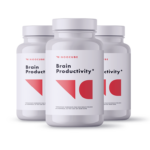Nootropil, commonly known as Piracetam, is a well-known nootropic belonging to the racetam family. It is widely used to improve cognitive function, memory, and learning. Piracetam was one of the first nootropics developed and is often prescribed to treat cognitive decline, dementia, and Alzheimer’s disease. It is also popular among healthy individuals looking for a cognitive boost.
How Does Nootropil Work?
Piracetam (the active ingredient in Nootropil) works by enhancing neurotransmitter activity in the brain, particularly that of acetylcholine and glutamate, which are essential for learning and memory. It also improves cerebral blood flow and increases oxygen consumption in the brain, which may contribute to improved mental performance.
Piracetam is thought to improve the fluidity of cell membranes, making it easier for brain cells to communicate with one another. This helps facilitate neuroplasticity, which is crucial for learning and memory formation.
Key Benefits of Nootropil
- Improves Memory and Learning: Nootropil is widely used to enhance memory retention and learning capacity, making it popular among students and individuals looking to boost their cognitive performance.
- Supports Cognitive Health in Aging: It is often prescribed to older adults to help slow cognitive decline associated with conditions like dementia or Alzheimer’s disease.
- Enhances Brain Function: By increasing cerebral blood flow and improving cell communication, Nootropil may improve overall mental clarity, focus, and concentration.
- Neuroprotective Effects: Some studies suggest that Piracetam may help protect the brain from damage due to oxidative stress and improve recovery from brain injuries or strokes.
Potential Side Effects
Although Nootropil is generally well-tolerated, some users may experience mild side effects, such as:
- Headaches: This is a common side effect when Piracetam is taken without a choline supplement.
- Insomnia: Taking Piracetam too late in the day can interfere with sleep.
- Nausea, anxiety, or nervousness in some individuals, particularly when used in high doses.
It is important to start with a low dose and adjust based on individual response, and to consult with a healthcare provider before using Nootropil, especially if you have any underlying conditions or are on medication.
Who Should Consider Using Nootropil?
Nootropil is ideal for individuals who:
- Want to enhance memory, learning, and mental clarity for academic or professional performance.
- Are looking for a nootropic to support cognitive health in aging or to manage mild cognitive decline.
- Prefer a well-researched and trusted nootropic with a long history of clinical use.
Final Thoughts: Is Nootropil Worth It?
From a medical standpoint, Nootropil (Piracetam) has a solid foundation of research supporting its use for memory enhancement, cognitive function, and neuroprotection. It is one of the most well-studied nootropics available, particularly for individuals experiencing cognitive decline. However, its effects on healthy individuals looking for cognitive enhancement are milder compared to other newer nootropics.
If you’re seeking a safe, well-tolerated, and proven nootropic, Nootropil may be a suitable choice. Its long track record in clinical practice makes it a reliable option, particularly for those managing age-related cognitive decline or looking to enhance memory and learning.
Recommended Health Supplements 2025
| Product | Price/bottle | Review | Visit |
|---|---|---|---|
 Weight Loss |
$69.99 | Review | PhenQ » |
 Gut Support |
$64.99 | Review | Your Biology Gut+ » |
 Weight Loss |
$64.99 | Review | Capsiplex Trim » |
 Cognitive Support |
$64.99 | Review | Brain Productivity » |
 Sleep Aid |
$64.99 | Review | Sleep Upgrade » |
- Dexaprine Review: Key Ingredients & Side Effects 2025
- Plexus Boost Review: Key Ingredients & Side Effects 2025
- CholestOff Review: Side Effects & Key Ingredients 2025
- EnergyBolizer Review 2025 - Side Effects & Ingredients
- Fentermina Review: Key Ingredients & Side Effects 2025
- Asensia Review: Side Effects & Ingredients Explained 2025
- Thrive Patch Review: Ingredients & Side Effects 2025
- Slendatrim Review: Side Effects & Key Ingredients 2025
- Balance Point Review: Side Effects & Ingredients…
- Leptiburn Review: Side Effects & Key Ingredients 2025
![Nootropil Review [year] - Side Effects & Ingredients](https://www.miriamwellness.com/wp-content/uploads/2023/11/Nootropil-Review-2023-Side-Effects-Ingredients-700x368.jpg)